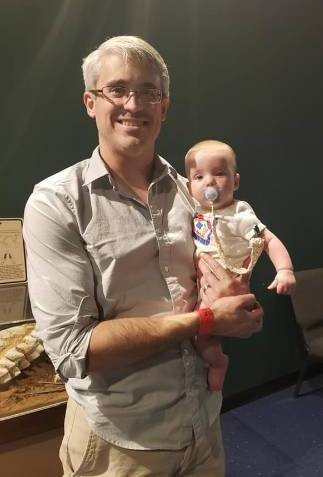Dr. John Havard

Dr. John Havard graduated from the University of South Alabama in 2004 as a triple major, with undergraduate degrees in English, Spanish, and Philosophy. Havard was quite familiar with USA not only because his parents graduated from the University in the early 1970s, but also because his mother worked here. When Havard decided to come to USA for college, his plan was to graduate and then go to law school. However, he says that with each passing semester the pull of literature increased, and the desire to become a lawyer lessened.
Today, Havard is Department Chairperson and an Associate Professor of English at Auburn University at Montgomery. He enjoys his career and believes his undergraduate experience in the College of Arts & Sciences well prepared him for earning his M.A. in Comparative Literature in 2007 from the University of South Carolina and his Ph.D. in English in 2012 from the University of Rochester.
Havard’s research explores how literature represents “the most divisive, momentous
issues in eighteenth- and nineteenth-century American history.” In particular, he
seeks to explain how “the formal and expressive capacities of literature provide unique
insights into those issues that are unavailable through other lenses.” Havard’s first
book, Hispanicism and Early US Literature: Spain, Mexico, Cuba, and the Origins of US National
Identity, was published by the University of Alabama Press in 2018. In this book, Havard examines
U.S. literary representations of Spain and Spanish America.
At Auburn University at Montgomery, Havard teaches a range of courses each semester.
He enjoys working with his students in his sophomore American literature survey courses.
Likewise, his upper-level literature courses are always a pleasure to teach.
Being the Department Chairperson allows Havard to engage his problem-solving skills. He says “As chair, you have the opportunity to advocate for your colleagues and students and to seek ways to support them. It is very gratifying when I’m successful in doing that.” He adds, “I work in a good department. We have several celebrated teachers and scholars, and it’s a pleasure to be able to serve them and assist them in their various enterprises.”
Given the trend towards lower enrollments in Humanities disciplines, Havard encourages students to think about how their degree can help them be successful after graduation. He says “English students should understand that their English major will be valued by employers in many fields. In general, employers need people who can think and write clearly and who understand how other people think and behave. English teaches these skills very effectively.” “Like other liberal arts disciplines,” Havard says, “English prepares students to do anything but not necessarily anything in particular. Students need to think carefully about which particular career field they’re interested in and how they will market the skill set they develop in their English major to employers in that field.”
As the English Department Chairperson, Havard tries to better understand the perspectives of employers and to remain aware of the different careers of AUM English graduates. According to Havard, he wants the AUM English curriculum and teaching “to be more responsive to student needs” and to understand “what’s working and not working for our former students.”
Research, teaching, and administration are major parts of Havard’s life, but his family comes first. He has two small children — his son is three and his daughter is 26 weeks old. Understandably, his children occupy Havard when he is not at work. According to Havard, “It’s a joy to be a father and watch them develop and grow.”
Havard enjoys cooking, gardening, and homebrewing beer and mead (honey wine). He has always enjoyed music, particularly playing guitar, mandolin, and piano. While he does not watch a lot of television, he has been watching The Good Place, and from time to time he will also watch some basketball and football.


